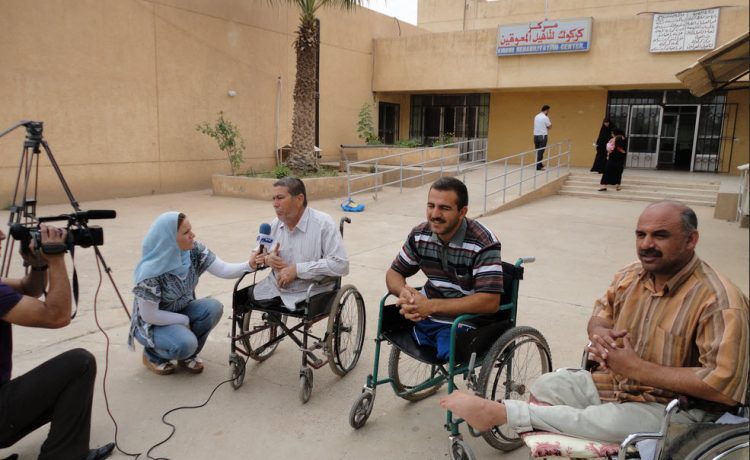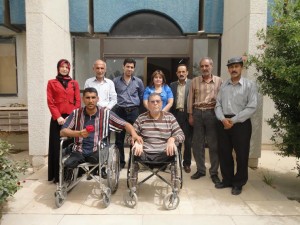first story
Handicapped on wheelchair Mr. Demiral Nour Al-deen a tukman citizen who lives in Bagdad road \Kirkuk expressed that his right leg was cut off, and he was not taken care by any party in the former regime, after 2003 and the fall of the regime he started to receive financial aid plus relief aids from civil society organization, he also expressed that he didn’t realize and know his rights as a handicap, and how can he obtain these rights. And when he was invited to participate in a handicapped-related project, he wasn’t quite excited because he thought that it wouldn’t contribute in his low economic situation and the truth that he has nothing but his wheelchair. After he had participated in these workshops, he and other participant gained experts and self-confidence as an active member in society. Also gained ability to defend his right as a handicap and through these workshops he was able to meet Iraqi parliament member Khalid Shwani in person after he used his gained skill from workshops, and he hoped that he can in addition to all handicaps that they can be more affective in the community.
second story
Director of the Association of Disabled Mr. Mahmood Hasan, an arab citizen who lives in Al-Hurya\ kirkuk, and he was working continuously with the disabled since 2003, and he is also a project coordinator. He said that since he started to work with the disabled about handicapped rights listed in international conventions and also in the Iraqi constitution and rules, especially the 32nd article. This drew the attention of the disabled about the need to claim these rights from the decision-makers and how important these rights are in accordance with the number of the disabled in IRAQ, because of the wars the country went in to plus the terrorism which resulted in increasing this number, so their role must be activated in the new society, as an active members though demanding their rights and apply what they have learnt from these workshops concerning their defend rights, these following points are considered in the process;
- Setting a general goal for the case
- Setting the special goal
- Planning for defending process
- setting the targeted decision-makers
- setting campaign massage
- building alliances( NGOs and media)
- Process methodology.
Third Story
Ahmed Mathlom born on 1987, one of project beneficiaries, who is disabled, lives in Aroba\ Kirkuk and he is single because he lacks the financial  qualifications, he praised the project for his ability to take part in the workshop which enabled him to know his international and national rights and how to claim these rights he added; “I’m very happy for participating in the workshops because it enabled him to build and enhance his personality and insistence on claiming my inactivated rights of the disabled. Those rights which are agreed upon in the international conventions and national laws, that was after he was provided with skills and spirit of leadership, all that made his( as he mentioned) an affective member in the community through meeting that the team held with the decision-makers from governmental and non-governmental institutes, and using indirect pressure on them by making conversations in order to activate some procedures that would raise the moral and economic level for the disabled.
qualifications, he praised the project for his ability to take part in the workshop which enabled him to know his international and national rights and how to claim these rights he added; “I’m very happy for participating in the workshops because it enabled him to build and enhance his personality and insistence on claiming my inactivated rights of the disabled. Those rights which are agreed upon in the international conventions and national laws, that was after he was provided with skills and spirit of leadership, all that made his( as he mentioned) an affective member in the community through meeting that the team held with the decision-makers from governmental and non-governmental institutes, and using indirect pressure on them by making conversations in order to activate some procedures that would raise the moral and economic level for the disabled.
Fourth Story
34 years Kurdish citizen Saadia Jasim, lives in Kirkuk\huzairan married with two children, she is the household, although she is disabled she have to support her family because of her sick husband and unable to work. She mentioned that before she was invited to participate in the workshops, she had no idea about civil society organizations and how these organizations are helpful to the disabled, through holding educational workshops that will improve the scientific and many other levels. These workshops will contribute in increasing the opportunities to overcome challenges. She also added that the trainings that she took were very important for its contribution in identifying the right of the disabled and improving their potentials and activating their roles in the community, when they get neglected by the government. She praised the valuable information and the trainings that she gained from the workshops and how it made her an active member of the society and now she could claim her inactivated rights from the decision-maker in governmental and non-governmental institutes.


